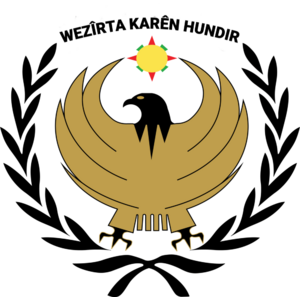Ministry of Interior (Rojadavistan)
This article is incomplete because it is pending further input from participants, or it is a work-in-progress by one author. Please comment on this article's talk page to share your input, comments and questions. Note: To contribute to this article, you may need to seek help from the author(s) of this page. |
| Wezareta Karên Hundir | |
 | |
| Agency overview | |
|---|---|
| Headquarters | Sermîyan |
| Employees | X |
| Annual budget | $X |
| Minister responsible |
|
| Website | gov |
The Ministry of Interior (Rojadavi: Wezareta Karên Hundir) is responsible for protecting Rojadavi citizens by ensuring security and stability, safeguarding property, and fighting crime. Its minister is a member of the Cabinet of Rojadavistan. The ministry's headquarters are in the capital, Sermîyan.
Zêrevanî
The Zêrevanî is Rojadavistan's gendarmerie. It is under the operational authority of the Ministry of Interior but is a part of the Rojadavistan Armed Forces. It is responsible for the security of government property and critical infrastructure, safeguarding important persons, and supporting civilan police and Asayîşa forces. There are over 85,000 active personnel serving in the Zêrevanî.
Organization
The ministry is organized
- Asayîşa (domestic intelligence and security agency)
- Zanyarî (foreign intelligence service)
- General Directorate of Police
- General Directorate of Civil Defense
- General Directorate of Civil Status
- General Directorate of Immigration and Passports
- General Directorate of Prisons
- General Directorate of Facilities Protection
Development Projects Center General Directorate of the Mujahideen High Commission for Industrial Security King Fahad Security College National Center for Security Operations Saudi National Central Bureau of INTERPOL General Department of Medical Services Directorate of Border Guard Troops Directorate of Personal Security
The Ministry of Interior (MOI) is the government body charged with overseeing policing and border control in Iraq.[1] The MOI comprises several agencies, including the Iraqi Police, Highway Patrol, Traffic Department, Emergency Response Unit, Explosive Ordnance Disposal Unit, and Department of Border Enforcement. Following passage of the Facilities Protection Service Reform Law, the Ministry absorbed FPS personnel previously spread among other ministries.[2] The MOI has approximately 380,430 employees, and the Ministry of Finance approved US$3.8 billion for its 2008 budget, representing a 21% growth over the previous year.[2]: 37
Border Guard Bangladesh
relations between the central government and local governments
logistics and organisation of political elections, at the national and prefectoral levels; the results of the elections are overseen by the Constitutional Council or the administrative courts
integration of legal immigrants (professionally, linguistically, housing)
all regional and departmental prefects and subprefects are subordinate to the Minister of the Interior
Department of Border Enforcement (DBE)
MOI Agency for Military Affairs Crime Research Center General Directorate of Border Guards General Department of Weapons and Explosives Ministerial Agency of Civil Affairs
Personal registrations such as birth, marriage etc.
Local government, city councils and local councils supervision
Appointing and dismissing District Commissioners
Elections
Departments
Emergency Service Administration
Role The Ministry of the Interior deals with administrative and other tasks related to the following:[4]
policing and criminal police activities that involve protection of life and personal security of people and property and the prevention and detection of crime; tracing and capturing of perpetrators of criminal offences and their bringing before the competent authorities; maintaining of public order and the protection of particular persons, citizens, facilities and premises; conducting of technical crime investigations and expert analysis; road traffic safety; state border protection; movement and stay of aliens and their admission; travel documents for crossing the state border; safeguarding at public gatherings; nationality affairs; issuing of identity cards and the registration of residence and sojourn; issuing of driving licences and the registration of motor vehicles; procurement, keeping and carrying of weapons and ammunition; explosive devices and substances; protection of the constitutional order; special police force tasks and the supervision over security agencies. The Ministry is also responsible for the following: keeping the records and statistics concerning the internal affairs, the internal affairs information system and the education and training of the Ministry's officers.